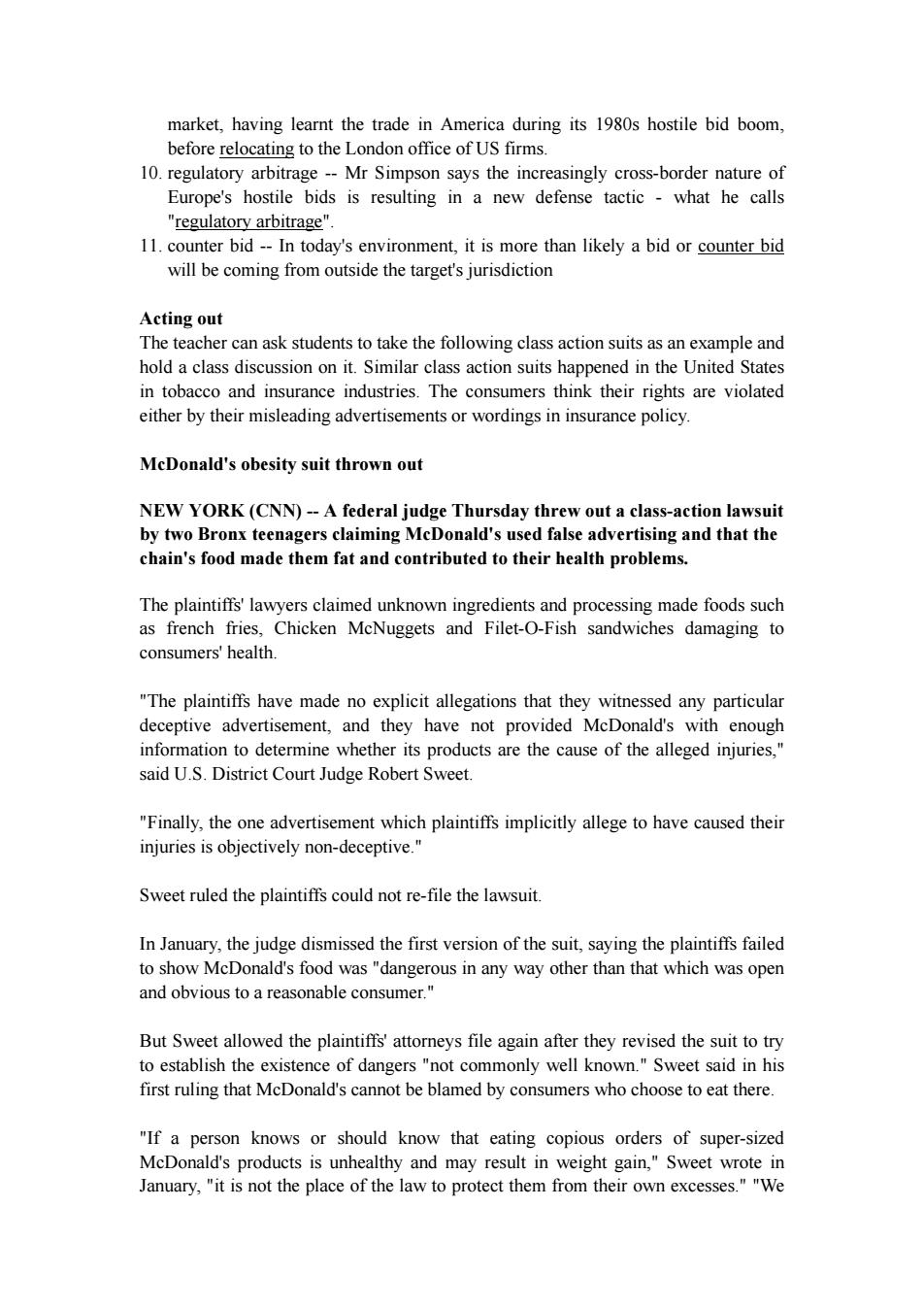正在加载图片...

market,having learnt the trade in America during its 1980s hostile bid boom, before relocating to the London office of US firms. 10.regulatory arbitrage--Mr Simpson says the increasingly cross-border nature of Europe's hostile bids is resulting in a new defense tactic -what he calls "regulatory arbitrage". 11.counter bid--In today's environment,it is more than likely a bid or counter bid will be coming from outside the target's jurisdiction Acting out The teacher can ask students to take the following class action suits as an example and hold a class discussion on it.Similar class action suits happened in the United States in tobacco and insurance industries.The consumers think their rights are violated either by their misleading advertisements or wordings in insurance policy. McDonald's obesity suit thrown out NEW YORK(CNN)--A federal judge Thursday threw out a class-action lawsuit by two Bronx teenagers claiming McDonald's used false advertising and that the chain's food made them fat and contributed to their health problems. The plaintiffs'lawyers claimed unknown ingredients and processing made foods such as french fries,Chicken McNuggets and Filet-O-Fish sandwiches damaging to consumers'health. "The plaintiffs have made no explicit allegations that they witnessed any particular deceptive advertisement,and they have not provided McDonald's with enough information to determine whether its products are the cause of the alleged injuries," said U.S.District Court Judge Robert Sweet. "Finally,the one advertisement which plaintiffs implicitly allege to have caused their injuries is objectively non-deceptive." Sweet ruled the plaintiffs could not re-file the lawsuit. In January,the judge dismissed the first version of the suit,saying the plaintiffs failed to show McDonald's food was "dangerous in any way other than that which was open and obvious to a reasonable consumer." But Sweet allowed the plaintiffs'attorneys file again after they revised the suit to try to establish the existence of dangers "not commonly well known."Sweet said in his first ruling that McDonald's cannot be blamed by consumers who choose to eat there. "If a person knows or should know that eating copious orders of super-sized McDonald's products is unhealthy and may result in weight gain,"Sweet wrote in January,"it is not the place of the law to protect them from their own excesses.""Wemarket, having learnt the trade in America during its 1980s hostile bid boom, before relocating to the London office of US firms. 10. regulatory arbitrage -- Mr Simpson says the increasingly cross-border nature of Europe's hostile bids is resulting in a new defense tactic - what he calls "regulatory arbitrage". 11. counter bid -- In today's environment, it is more than likely a bid or counter bid will be coming from outside the target's jurisdiction Acting out The teacher can ask students to take the following class action suits as an example and hold a class discussion on it. Similar class action suits happened in the United States in tobacco and insurance industries. The consumers think their rights are violated either by their misleading advertisements or wordings in insurance policy. McDonald's obesity suit thrown out NEW YORK (CNN) -- A federal judge Thursday threw out a class-action lawsuit by two Bronx teenagers claiming McDonald's used false advertising and that the chain's food made them fat and contributed to their health problems. The plaintiffs' lawyers claimed unknown ingredients and processing made foods such as french fries, Chicken McNuggets and Filet-O-Fish sandwiches damaging to consumers' health. "The plaintiffs have made no explicit allegations that they witnessed any particular deceptive advertisement, and they have not provided McDonald's with enough information to determine whether its products are the cause of the alleged injuries," said U.S. District Court Judge Robert Sweet. "Finally, the one advertisement which plaintiffs implicitly allege to have caused their injuries is objectively non-deceptive." Sweet ruled the plaintiffs could not re-file the lawsuit. In January, the judge dismissed the first version of the suit, saying the plaintiffs failed to show McDonald's food was "dangerous in any way other than that which was open and obvious to a reasonable consumer." But Sweet allowed the plaintiffs' attorneys file again after they revised the suit to try to establish the existence of dangers "not commonly well known." Sweet said in his first ruling that McDonald's cannot be blamed by consumers who choose to eat there. "If a person knows or should know that eating copious orders of super-sized McDonald's products is unhealthy and may result in weight gain," Sweet wrote in January, "it is not the place of the law to protect them from their own excesses." "We